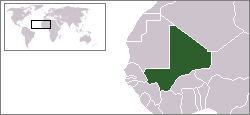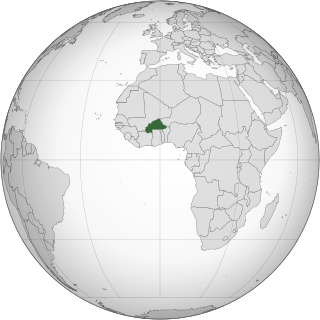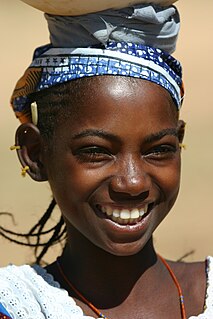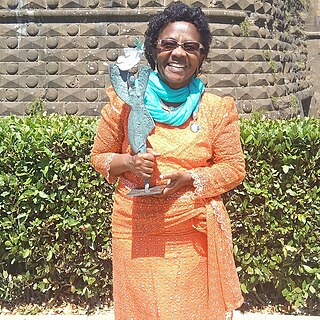Related Research Articles

Moussa Traoré is a Malian soldier and politician who was President of Mali from 1968 to 1991. As a Lieutenant, he led the military ousting of President Modibo Keïta in 1968. Thereafter he served as head of state until March 1991, when he was overthrown by popular protests and a military coup. He was twice condemned to death in the 1990s, but eventually pardoned on both occasions and freed in 2002. He has since retired from political life.

Lesbian, gay, bisexual, and transgender (LGBT) persons in Mali may face legal challenges not experienced by non-LGBT residents. LGBT persons face stigmatization among the broader population. According to the 2007 Pew Global Attitudes Project, 98 percent of Malian adults believe that homosexuality is a way of life that society should not accept, which was the highest rate of non-acceptance in the 45 countries surveyed.

Lesbian, gay, bisexual, transgender (LGBT) persons in Burkina Faso may face legal issues not experienced by non-LGBT citizens. Same-sex sexual acts between men and between women are legal in Burkina Faso.

According to the U.S. Department of State's annual report on human rights in Mali for 2003, Mali's government generally respects the human rights of its citizens and observes relevant constitutional provisions and prohibitions.
Association Malienne des Droits de l'Homme (AMDH) is a Malian non-profit human rights non-governmental organization founded in Bamako, Mali on 11 December 1988.
AJM may refer to:

The status and social roles of women in Mali have been formed by the complex interplay of a variety of traditions in ethnic communities, the rise and fall of the great Sahelien states, French colonial rule, independence, urbanisation, and postcolonial conflict and progress. Forming just less than half Mali's population, Malian women have sometimes been the center of matrilineal societies, but have always been crucial to the economic and social structure of this largely rural, agricultural society.

Discussions of LGBT rights at the United Nations have included resolutions and joint statements in the United Nations General Assembly and the United Nations Human Rights Council (UNHRC), attention to the expert-led human rights mechanisms, as well as by the UN Agencies.
Mali is a source, transit, and destination country for men, women, and children subjected to trafficking in persons, specifically forced labor and, to a lesser extent, forced prostitution. Within Mali, women and girls are forced into domestic servitude and, to a limited extent, prostitution. Malian boys are found in conditions of forced begging and forced labor in gold mines and agricultural settings both within Mali and neighboring countries. Reports indicate that Malian children are trafficked to Senegal and Guinea for forced labor in gold mines and for forced labor on cotton and cocoa farms in Côte d'Ivoire. Boys from Mali, Guinea, Burkina Faso, Niger and other countries are forced into begging and exploited for labor by religious instructors within Mali and across borders. Adult men and boys, primarily of Songhai ethnicity, are subjected to the longstanding practice of debt bondage in the salt mines of Taoudenni in northern Mali. Some members of Mali's black Tamachek community are subjected to traditional slavery-related practices rooted in hereditary master-slave relationships.
Since the January 2011 revolution in Tunisia and protests across the Middle East and North Africa (MENA) began, many Western news sources have published articles discussing the unprecedented role that Tunisian women played in the protests. Many of these articles highlight some of the secular freedoms instituted by Habib Bourguiba in 1956, such as access to higher education, the right to file for divorce, and certain job opportunities. While women in Tunisia have enjoyed certain freedoms and rights that are often denied to women in neighboring countries, the social norms have shifted since 2011. Additionally, even though some aspects of society were relatively liberal, the regime still classified itself as a Muslim people. Thus, women in Tunisia live within an oscillating society that at times encourages strict abidance to Islamic law. Inheritance laws are indirectly based on Islamic inheritance jurisprudence, with religion never being mentioned in the Code of Personal Status; these laws accord to women half the share of property due to men.
Prostitution in Mali is legal, but third party activities such as procuring are illegal. Prostitution is common in Malian cities. UNAIDS estimate there to be 35,900 prostitutes in the country. Prostitution is on the rise, many having turned to prostitution because of poverty.
Sidiki Kaba, is the keeper of the seals and the Minister of Justice of Senegal since 2013. On 8 December 2014, he was elected as President of the Assembly of States Parties to the Rome Statute of the International Criminal Court as consensus candidate from the African States Parties and endorsed by the Bureau of the Assembly. He will serve as President of the Assembly, which operates from New York and The Hague, while also continuing his functions as Minister of Justice from Dakar.
Sana Ben Achour is a Tunisian academic, lawyer and activist, and a specialist in public law. She is a professor of public law at the Faculty of Legal, Political and Social Sciences at the University of Carthage. She is active in several feminist organisations, and has founded a women's refuge shelter.

Katana Gégé Bukuru is a Congolese activist fighting for women rights. She is also the founder of the SOFAD.
Zeinebou Mint Taleb Moussa is a women's rights activist in Mauritania, focused on combating sexual violence through her work as founder of El Wafa, a survivors' center, and as president of the non-governmental organization the Mauritanian Association for Maternal and Child Health.

Kamissa Camara is a Malian political analyst and politician. She served as the country's Minister of Foreign Affairs in 2018 and 2019, and she is currently Mali's Minister of Digital Economy and Planning.
The Tunisian Association of Democratic Women is a Tunisian feminist association which was founded in 1989.

Najma Kousri is a Tunisian feminist and LGBT-rights activist. Kousri is a co-founder of the #EnaZeda movement and a co-ordinator of the Tunisian Association of Democratic Women. She is a campaigner for LGBT rights and her photographic project documenting the lives of same-sex couples went viral in 2017.
The Wassila network or l'Association contre les violences faites aux femmes et aux enfants or Avife is a network of Algerian citizens' groups and institutions that defend women's rights, established in October 2000.
References
- 1 2 3 Marijke van der Engel; Gerti Hesseling. "Women and law in Mali". In J. A. Andersson; M. Breusers (eds.). Kinship structures and enterprising actors: Anthropological essays on development (PDF). pp. 303, 310–11.
- ↑ Kether R. Hayden, Women's Associations in Mali: Empowerment, Leadership, and Political Mobilization, Student thesis, 18 April 2008.
- 1 2 Kathleen Sheldon (2005). "Association de Juristes Maliennes". Historical Dictionary of Women in Sub-Saharan Africa. Scarecrow Press. p. 23. ISBN 978-0-8108-6547-1.
- ↑ Groupe d Appui à la Réforme Juridique, La situation de la femme dans le droit positif malien et ses perspectives d'évolution, 1995.
- ↑ Immigration and Refugee Board of Canada, [Mali : Forced marriage, including the prevalence of forced marriage, related legislation, state protection, support services and the ability of women to refuse a forced marriage (2012 – June 2016)], 15 July 2016.
- ↑ Mégane Ghorbani, Mali: No Peace Building without Women, Association for Women's Rights in Development, 28 July 2015.